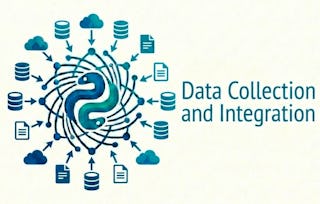The course will equip you with the competencies and essential skills required to excel in the American Society for Quality (ASQ) Certified Six Sigma Yellow Belt (CSSYB) exam and contribute to process improvement programs. This course focuses on various data collection tools and techniques to analyze data, identify the root causes of a problem, and explore the concepts of measurement system analysis (MSA), and hypothesis testing.

Data Collection and Root Cause Analysis

Data Collection and Root Cause Analysis
Dieser Kurs ist Teil von Spezialisierung „ ASQ-Certified Six Sigma Yellow Belt Exam Prep Specialization“


Dozenten: SkillUp
Bei enthalten
13 Bewertungen
Empfohlene Erfahrung
Was Sie lernen werden
Define data requirements to gather relevant data from the process using appropriate data collection methods.
Calculate baseline process performance metrics based on the collected data.
Analyze data for variations and use data analysis tools and techniques to identify the root causes for the problem or variation.
Kompetenzen, die Sie erwerben
- Kategorie: Six Sigma Methodology
- Kategorie: Descriptive Statistics
- Kategorie: Correlation Analysis
- Kategorie: Lean Six Sigma
- Kategorie: Root Cause Analysis
- Kategorie: Regression Analysis
- Kategorie: Pareto Chart
- Kategorie: Statistical Hypothesis Testing
- Kategorie: Process Improvement
- Kategorie: Statistical Analysis
- Kategorie: Data Collection
- Kategorie: Statistical Inference
- Kategorie: Data Analysis
- Kategorie: Process Analysis
- Der Fähigkeiten-Abschnitt ist eingeklappt. 9 von 14 Fähigkeiten werden angezeigt.
Wichtige Details

Zu Ihrem LinkedIn-Profil hinzufügen
Erfahren Sie, wie Mitarbeiter führender Unternehmen gefragte Kompetenzen erwerben.

Erweitern Sie Ihre Fachkenntnisse
- Lernen Sie neue Konzepte von Branchenexperten
- Gewinnen Sie ein Grundverständnis bestimmter Themen oder Tools
- Erwerben Sie berufsrelevante Kompetenzen durch praktische Projekte
- Erwerben Sie ein Berufszertifikat zur Vorlage

In diesem Kurs gibt es 4 Module
This module introduces you to descriptive statistics, a branch of statistics that involves summarizing and describing the main features of a dataset. It provides tools and techniques to organize, present, and analyze data to gain insights into its central tendencies, variability, and distribution. Descriptive statistics is fundamental in data analysis and is a basis for more advanced statistical methods. You will also be introduced to inferential statistics. The module also explains the various data types and helps you differentiate between qualitative and quantitative data and data coming from internal and external sources. It describes the data collection process. Further, the module delves into the concept of measurement system analysis (MSA) and its components to understand the variations in the measurement process.
Das ist alles enthalten
8 Videos2 Lektüren3 Aufgaben1 Diskussionsthema
This module explains the differences between value-added and non-value-added activities. It makes a case for non-value-added activities that are necessary to enable the smooth running of the organization. The module also discusses how to identify the bottlenecks in a system and suggests ways to eliminate them. Lastly, the module explores the various techniques to conduct a root cause analysis (RCA) for the identified problem in your process or organization. The first one, Pareto analysis, is based on the Pareto principle, which states that approximately 80% of the effects come from 20% of the causes. This analysis helps prioritize potential root causes based on their relative impact. You will also learn how to use the fishbone diagram, also known as the Ishikawa or cause and effect diagram, which visually represents the potential causes contributing to a problem while categorizing the possible causes into specific groups to facilitate the identification of root causes. Additionally, you will learn about the five whys, a simple yet powerful technique involving repeatedly asking “why” to identify the root cause of a problem. It helps to peel the layers of symptoms and surface-level causes to get to the core issue.
Das ist alles enthalten
5 Videos1 Lektüre3 Aufgaben1 Diskussionsthema
This module provides a comprehensive overview of hypothesis testing, an essential statistical tool used to assess the validity of claims or hypotheses about populations. You will learn about the hypothesis testing process, its application in real-world scenarios, and how to interpret the hypothesis test results to make better decisions. The module will take you through the different types of hypotheses, types of errors, and the significance of the p-value in hypothesis testing. You will also learn about the principles and applications of correlation and regression techniques. The module discusses the types of correlation and the roles of dependent and independent variables in regression analysis. lt explains the implications of R-squared values in regression analysis. The module also explains simple linear regression and the difference between deterministic and probabilistic models.
Das ist alles enthalten
8 Videos1 Lektüre3 Aufgaben1 Diskussionsthema
This is a peer-review assignment based on the concepts taught in the Data Collection and Root Cause Analysis course. In this assignment, you will apply your knowledge of hypothesis testing to a real-life scenario.
Das ist alles enthalten
1 Video2 Lektüren1 peer review
Erwerben Sie ein Karrierezertifikat.
Fügen Sie dieses Zeugnis Ihrem LinkedIn-Profil, Lebenslauf oder CV hinzu. Teilen Sie sie in Social Media und in Ihrer Leistungsbeurteilung.
Mehr von Data Analysis entdecken
 Status: Kostenloser Testzeitraum
Status: Kostenloser TestzeitraumUniversity of Maryland, College Park
 Status: Kostenloser Testzeitraum
Status: Kostenloser Testzeitraum Status: Kostenloser Testzeitraum
Status: Kostenloser TestzeitraumUniversity of Colorado Boulder
 Status: Kostenloser Testzeitraum
Status: Kostenloser Testzeitraum
Warum entscheiden sich Menschen für Coursera für ihre Karriere?

Felipe M.

Jennifer J.

Larry W.

Chaitanya A.
Bewertungen von Lernenden
- 5 stars
80 %
- 4 stars
10 %
- 3 stars
0 %
- 2 stars
5 %
- 1 star
5 %
Zeigt 3 von 13 an
Geprüft am 31. März 2024
Effective course with proper explanation of the fundamentals.

Neue Karrieremöglichkeiten mit Coursera Plus
Unbegrenzter Zugang zu 10,000+ Weltklasse-Kursen, praktischen Projekten und berufsqualifizierenden Zertifikatsprogrammen - alles in Ihrem Abonnement enthalten
Bringen Sie Ihre Karriere mit einem Online-Abschluss voran.
Erwerben Sie einen Abschluss von erstklassigen Universitäten – 100 % online
Schließen Sie sich mehr als 3.400 Unternehmen in aller Welt an, die sich für Coursera for Business entschieden haben.
Schulen Sie Ihre Mitarbeiter*innen, um sich in der digitalen Wirtschaft zu behaupten.
Häufig gestellte Fragen
To access the course materials, assignments and to earn a Certificate, you will need to purchase the Certificate experience when you enroll in a course. You can try a Free Trial instead, or apply for Financial Aid. The course may offer 'Full Course, No Certificate' instead. This option lets you see all course materials, submit required assessments, and get a final grade. This also means that you will not be able to purchase a Certificate experience.
When you enroll in the course, you get access to all of the courses in the Specialization, and you earn a certificate when you complete the work. Your electronic Certificate will be added to your Accomplishments page - from there, you can print your Certificate or add it to your LinkedIn profile.
Yes. In select learning programs, you can apply for financial aid or a scholarship if you can’t afford the enrollment fee. If fin aid or scholarship is available for your learning program selection, you’ll find a link to apply on the description page.
Weitere Fragen
Finanzielle Unterstützung verfügbar,
¹ Einige Aufgaben in diesem Kurs werden mit AI bewertet. Für diese Aufgaben werden Ihre Daten in Übereinstimmung mit Datenschutzhinweis von Courseraverwendet.

